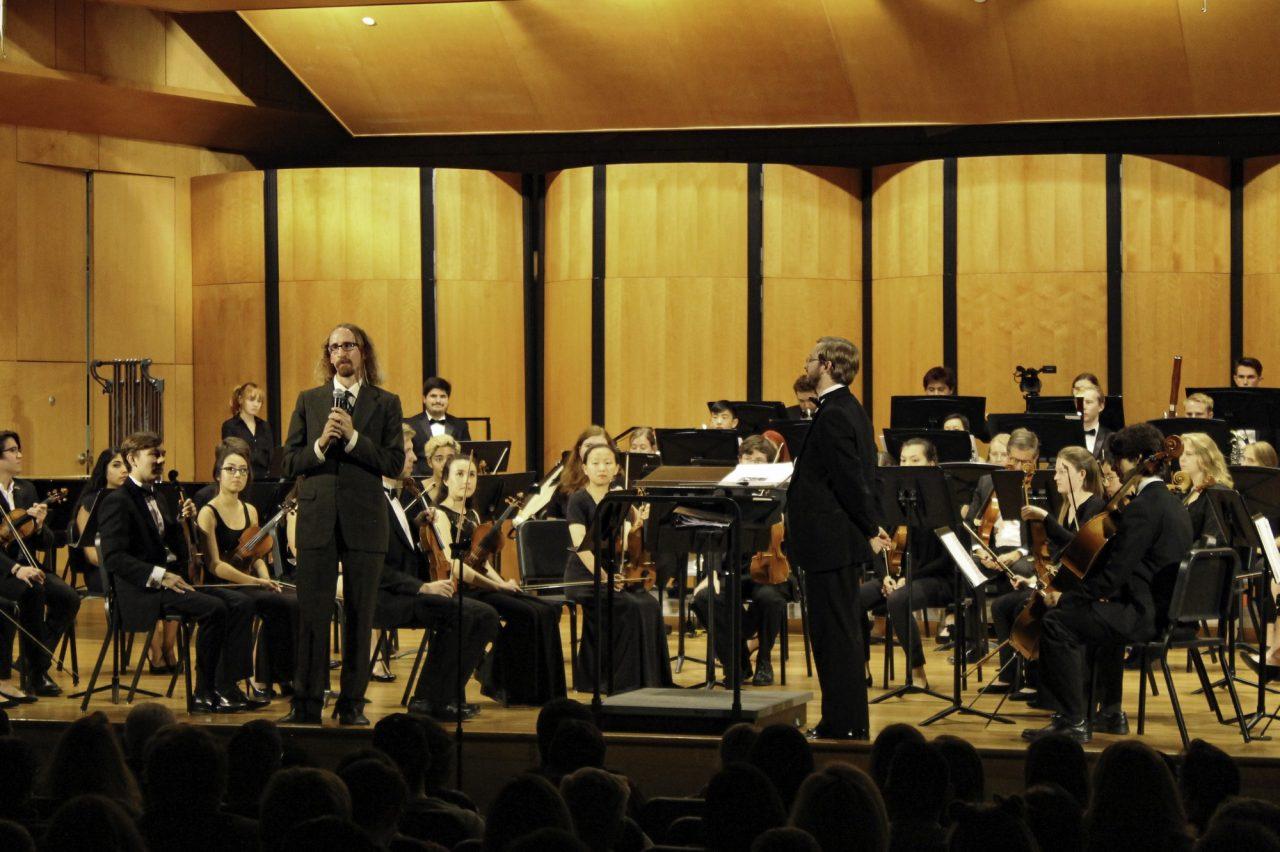Photo by Oliver Chapin-Eiserloh
There was an evident sense of excitement in the Ruth Taylor Recital Hall as people packed in their seats for a show entitled “Trinity at 150: A Celebration”. Soon, the hall was above its capacity and disappointed concert-goers were ushered into an adjacent classroom that had earlier been designated for overflow seating. Desperate parents bickered over seats that had been saved inadequately with event programs.
While past Trinity Symphony Orchestra events have filled the hall, none that I’ve seen have generated quite this much excitement. All of this buzz was because of one thing: the debut of an entirely new symphony
Last Saturday, Oct. 19, the Trinity University Symphony Orchestra along with faculty conductor Joseph Kneer performed the world premiere of the symphony entitled “Trinity.” This symphony is the brain-child of resident faculty composer, Brian Bondari. Bondari had the idea to create a piece of music to honor Trinity University as it celebrates its 150th year of operation. Bondari began writing, and what began as a single movement piece soon grew to be the symphony that it is today.
Despite the slough of other “Trinity at 150” events, this particular one seemed to stand out, it would seem because of the home-grown nature of the piece being performed.
The “Trinity” symphony itself was a hit. The first movement, entitled Ethos, and the second movement, entitled Pathos, were both amazing in that they seemed to draw out emotions that could easily be associated with many different aspects of life at Trinity over the years. Moments of despair for the times of struggle and moments of joy for all the happy memories were all there. It seemed to sum up the last 150 years about as well as anything could.
However, it was the third movement, Logos, that stole my heart. If Ethos and Pathos represented the past and present, Logos was the future. With the fanfare like melody, it was triumphant and exciting. With so many new and exciting things happening every day at Trinity and with so many plans for future growth and enhancement, Logos seemed to perfectly encapsulate where this institution is headed in the coming years.
Despite an overall amazing performance, there were a few less than perfect moments that are worth noting. At the beginning of the concert, the music began, but the house lights failed to dim leaving people audibly confused. Soon the problem was rectified, and the show continued. The other aspect that I thought could use a little work was, ironically, the third movement of “Trinity.” While the music itself was melodic, there seemed to be an issue with the continuity of volume.
The music would fluctuate from quiet to loud, almost to the point where I wanted to cover my ears, and then back again in a very dramatic and unnerving way. This problem is probably just due to the fact that this was a world premiere and there was very little time to work out these kinks.
In addition to “Trinity”, the symphony played three other pieces that were selected at 50-year intervals to make certain anniversaries in Trinity’s history. The concert opened with sections from De Falla’s El Amor Brujo, a ballet written in 1915 about a women’s struggle of being haunted by her dead husband’s ghost. This part of the performance, while intriguing, was slightly overshadowed by the impending “Trinity” symphony.
The second work performed was “Ach, ich fühl’s” from The Magic Flute, an opera composed by Mozart in the late 1700’s. What set this piece apart from the rest was the stellar vocal performance by senior business administration major and Rosland Phillips Vocal Competition winner Odet Torres. Her voice drew in the audience and made this a memorable part of the larger show.
The performance closed with a rousing performance of Dvořák’s Slavonic Dance in G Minor. This piece served as the perfect bookend to the concert, as it came right after the performance of Logos.
The night as a whole appeared to be a rousing success and served as a testament to what Trinity was, is and will amount to in the future.







